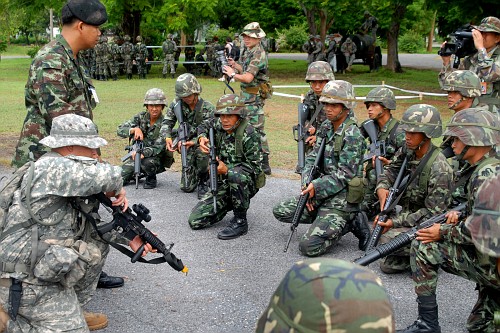Thai army steps in to restore order after protest turns violent
 Bangkok - The Thai army early Tuesday deployed hundreds of troops to Government House, which has been occupied by protestors for the past week, after a clash between pro-government and anti- government groups left at least one demonstrator dead.
Bangkok - The Thai army early Tuesday deployed hundreds of troops to Government House, which has been occupied by protestors for the past week, after a clash between pro-government and anti- government groups left at least one demonstrator dead.
"Soldiers must leave the barracks to help restore peace," said Army Commander-in-Chief General Anupong Paojinda.
Some 400 anti-riot troops were posted at Government House, the seat of administration, to prevent further clashes, said the Bangkok Post online news service.
Shortly after 2 a. m. a pro-government mob marched on Government House and clashed with front-line guards of the People's Alliance for Democracy (PAD) on the outskirts of the compound, killing at least one PAD member, and injuring about 20 others.
Government House was seized by thousands of followers of the People's Alliance for Democracy (PAD), a loose alliance of conservative groups demanding the resignation of Thai Prime Minister Samak Sundaravej, on August 26 and has been occupied since.
Samak, a veteran right-wing politician, has faced a dilemma evicting the squatters from Government House because of the reluctance of the police and military to use force against them.
The PAD comprises mainly middle class Thais, devoted to the monarchy and fed up with corrupt elected politicians.
PAD leader Sonthi Limthongkul predicted Monday that the government would resort to using a hired mob to move the demonstration from Government House.
Sonthi Limthongkul, one of five leaders of the PAD, said that government members of parliament were busing in thousands of members of the United Front of Democracy Against Dictatorship, a pro- government grouping, from the provinces to rid Government House of its unwelcome guests.
He claimed the "thugs" were being paid 200 baht (5.80 dollars) a day.
"We will just hold the fort in a very peaceful way," said Sonthi, a media entrepreneur who has been at the heart of the PAD movement since it began in early 2006 as a spearhead to topple the previous administration of former premier Thaksin Shinawatra.
Thaksin was ousted by a military coup on September 19, 2006, and now the PAD wants to force his protege, or "nominee," current Prime Minister Samak Sundaravej, to resign.
The PAD has been staging peaceful anti-government demonstrations on Rajdamnoen Avenue in the old section of Bangkok since May 25.
But the PAD's detractors say the movement is undermining Thailand's electoral democracy, imperfect though it may be.
Last Tuesday, in what the PAD dubbed "D-Day," the movement rallied more than 10,000 supporters who stormed Government House and seized the cabinet's working headquarters.
Efforts by police to forcibly oust the demonstrators from Government House on Friday failed. On Sunday, Samak transferred the Bangkok Metropolitan Police chief who had ordered a soft response to the protestors.
Friday's show of force drew immediate criticism from a broad swathe of Thai society, and prompted PAD supporters to raid and shut down three airports in southern Thailand. The three airports at Hat Yai, Krabi and Phuket all reopened Sunday.
The labour union at the state-run State Railways of Thailand (SRT) also went on strike as of Friday. As of Monday, the SRT was operating only 129 of its 244 trains.
The SRT board resigned en masse Monday, after the state enterprise reported a 60-million-baht (1.9-million-dollars) loss due to the partial strike.
On Monday, the labour unions of 43 state enterprise labour unions threatened to stop work Wednesday, to pressure Samak to resign.
Union leaders Sawit Kaewwan and Sirichai Mai-ngam told a press conference that more than 200,000 members of the 43 state enterprise labour unions nationwide had jointly agreed to stop work which involves public utilities such as tap water, electricity supplies and transportation systems starting from 9 am Wednesday to "end the political problems" created by the government of Mr Samak." (dpa)